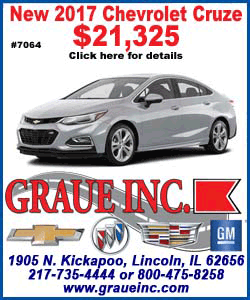|
Big win for automakers as
Trump orders fuel economy standards review
 Send a link to a friend
Send a link to a friend
 [March 16, 2017]
By Nick Carey and David Shepardson [March 16, 2017]
By Nick Carey and David Shepardson
DETROIT/WASHINGTON
(Reuters) - President Donald Trump on Wednesday ordered a review of
tough U.S. vehicle fuel-efficiency standards put in place by the Obama
administration, handing a victory to auto industry executives and
provoking criticism from Democrats and environmental groups.
In a move widely seen as a preamble to loosening fuel standards, Trump
told an audience of cheering union workers, he would "ensure that any
regulations we have protect and defend your jobs, your factories," and
promised he would encourage growth in the U.S. auto sector.
"The assault on the American auto industry is over," Trump said,
standing in front of a banner that read "Buy American-Hire American."
Trump added that the White House is "setting up a task force in every
federal agency to identify and remove any regulation that undermines
American auto production."
The backdrop and message underscored Trump's efforts to lock down
support in industrial states such as Michigan that put him in the White
House. Trump spoke at the site of the former Willow Run bomber factory
in Ypsilanti, Michigan, which won fame for building an operational B-24
heavy bomber every 59 minutes during World War Two. Now, the site is
being redeveloped as a testing ground for autonomous vehicles.

At a roundtable with industry leaders Trump made clear he expected
automakers to hire more Americans in return, a theme that dominated his
election campaign.
"We're going to do some wonderful work with you, but you're going to
have to help us with jobs," he said.
Trump's event was attended by around 1,000 people, including automotive
executives, United Auto Workers union President Dennis Williams - who
sat next to Trump - and workers from Detroit's "Big Three" automakers:
General Motors Co <GM.N>, Ford Motor Co <F.N> and Fiat Chrysler
Automobiles NV (FCA) <FCHA.MI> <FCAU.N>. Automakers lined up examples of
vehicles they build in the United States for the president to see.
Auto industry executives have said they are hopeful the Trump
administration will pursue tax and regulatory policies that would
benefit U.S. manufacturers.
Reopening the fuel efficiency rules put in place by Democratic President
Barack Obama days before he left office is one of the top items on the
industry's agenda. Automakers, through their lobbying groups, have said
the Obama rules were too expensive and could cost American jobs.
"These standards are costly for automakers and the American people,"
said Environmental Protection Agency Administrator Scott Pruitt.
After one participant in Wednesday's meetings mentioned environmental
concerns, Trump said he agreed but did not want an "extra thimbleful of
fuel" to get in the way of growth.

In a meeting with top auto executives from U.S. and foreign automakers,
Trump said the government needs to get out of the way of the auto
industry building vehicles, a person who attended the meeting said.
Automakers are wary of being seen as out of touch with environmental
concerns, or unwilling to invest in new technology. Ford, for example,
used its Twitter account on Wednesday to highlight previously announced
commitments to develop electric vehicles.
It could take a year for the review process to play out, and Wednesday's
event was effectively a starting gun for intense lobbying efforts over
how government policy will drive technology investment decisions in the
auto sector.
Critics like Democratic U.S. Senator Edward Markey of Massachusetts said
Trump's move could hurt consumers.
"Filling up their cars and trucks is the energy bill Americans pay most
often, but President Trump's roll-back of fuel economy emissions
standards means families will end up paying more at the pump," Markey
added.
[to top of second column] |

White House Senior Advisor Steve Bannon attends a roundtable
discussion held by U.S. President Donald Trump with auto industry
leaders at the American Center for Mobility in Ypsilanti Township,
Michigan, U.S., March 15, 2017. REUTERS/Jonathan Ernst

The
president is not seeking to revoke California's authority to set vehicle
efficiency rules even stricter than federal rules, including mandated sales of
electric vehicles, as part of this move, a White House official said. The
official did not rule out seeking to withdraw California's authority in the
future. Pruitt, an ally of the fossil fuel industry, would not commit during his
Senate confirmation hearing to allowing California to continue its own clean
vehicle rules.
A group of 10 state attorneys general led by California and New York said on
Wednesday they would fight attempts to weaken the rules.
Californiaís attorney general late Tuesday filed legal papers in a federal court
defending the Obama administrationís decision to finalize the determination in
January.
Barclays auto analyst Brian Johnson said in a research note that he expects the
Trump administration review will lead to reductions in planned hikes in fuel
efficiency standards after 2021.
The Obama administration's rules, negotiated with automakers in 2012, were aimed
at doubling average fleetwide fuel efficiency to 54.5 miles per gallon by 2025,
although the real-world mileage figures would be lower.
'THOUGHTFUL AND COORDINATED'
Automotive industry executives and lobbying groups were quick to praise the
administration's announcement.
"The Trump administration has created an opportunity for decision-makers to
reach a thoughtful and coordinated outcome predicated on the best and most
current data," said Mitch Bainwol, chief executive of the Alliance of Automobile
Manufacturers, an industry lobbying group.
Automakers have signaled they want the government to give manufacturers more
credit toward achieving fuel efficiency targets for technologies such as
"stop-start" systems that shut down a carís engine at a traffic light.

Regulators should also look at whether ride hailing and vehicle-to-vehicle
communications systems designed to prevent accidents and alleviate road
congestion could be counted toward the industryís greenhouse gas emissions
goals, the automaker group proposed in comments to the EPA last year. The group
represents a dozen automakers, including GM, Ford and FCA.
Under the 2012 agreement with the industry, the EPA was given until April 2018
to decide whether the standards were feasible under a "midterm review," but the
agency moved up its decision to a week before Obama left office in a bid to
maintain a key part of his administration's environmental legacy.
An EPA analysis indicated that compared with previous rules, the 2025 standards
would result in savings of between $1,460 and $1,620 over the lifetime of a
vehicle and payback for new technology required to meet the new standards of
around five years.
The Obama administration said the rules would cost the auto industry $200
billion over 13 years, but save motorists $1.7 trillion over the life of the
vehicles.
(Additional reporting by Bernie Woodall, Emily Stephenson and Susan Heavey;
Writing by Will Dunham; Editing by Lisa Shumaker and Jonathan Oatis)
[© 2017 Thomson Reuters. All rights
reserved.] Copyright 2017 Reuters. All rights reserved. This material may not be published,
broadcast, rewritten or redistributed.
 |